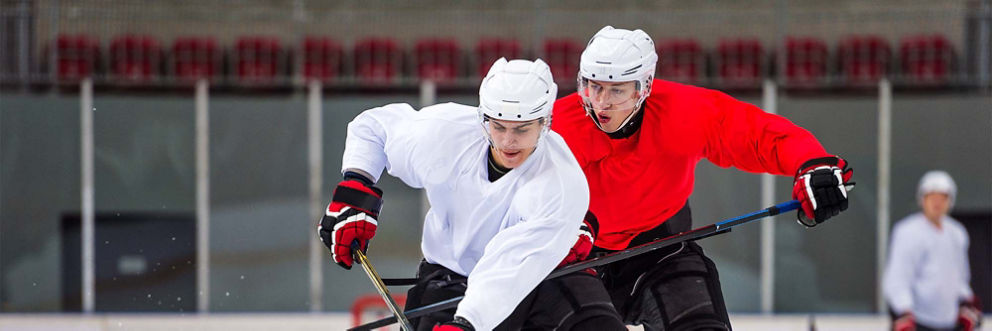Sport concussion program
Comprehensive care for concussions in the Twin Cities
When you’re in the middle of the action playing your favorite sport, collisions and falls involving trauma to the head can happen unexpectedly. If you think you may be dealing with a concussion, getting expert care is important for both short-term and long-term recovery.
TRIA has the only interdisciplinary Sport Concussion Program in the region, specializing in helping athletes return to their physical, academic and social activities as safely – and as quickly – as possible. Our team is made up of expert doctors, neuropsychologists, physical therapists and athletic trainers all working together in one location to provide concussion care based on the most recent scientific research and evidence-based studies.
We aim to provide immediate appointment access for concussion patients because of the seriousness of the injury, as well as the impact it can have on a patient’s quality of life. We serve athletes from youth to professional levels, and we understand that no two concussions are the same. No matter your age or sport, we’re here with the care you need and a personalized treatment plan to help you get back to what you love.
How the Sport Concussion Program works
Our Sport Concussion Program is offered to athletes ages 5 through 60. This includes individuals who are trying to return to sports participation, recreational activities or simply an active lifestyle after a concussion.
Evaluation process
Our concussion evaluation begins with a comprehensive interview to understand your medical history, as well as symptoms and the recovery time for any previous concussions. You’ll also have physical and neurological exams to assess balance, and vestibular and ocular motor function. Computerized neurocognitive testing through the ImPACT Application Assessment Tools help us determine details about your injury, prognosis and the best treatment options for you.
Creating your customized treatment plan
After the evaluation, our care team will create a personalized treatment plan that’s tailored to your unique needs. This will also include concussion education and an estimated recovery time, with guidelines for school, work and physical activity.
Next, you’ll be referred to the appropriate specialists for the therapies we’ve recommended. Our care team works closely together to ensure a coordinated effort toward your recovery. Each member of the team will be up to speed on your information, and we’ll be by your side every step of the way as you heal.
Sport Concussion Program treatment options
A concussion takes time to heal, and every person needs a unique treatment plan. We have a variety of specialized services to help with your recovery.
Neuropsychology
Unique to our program, our neuropsychologists specialize in assessing and treating concussions. We use a variety of tests designed to evaluate common cognitive symptoms that follow a concussion like difficulties concentrating, memory concerns, and psychosocial factors that may impact recovery.
Our neuropsychologists will guide you toward the best treatment options and through challenges at school or work. We’ll also help you with social or behavioral modifications that will keep you more comfortable. And we’ll work with you to help prevent future injuries, determine the next steps in your treatment plan and make decisions about returning to play
We also offer
Vestibular and ocular motor therapy
Vestibular and ocular motor therapy is a branch of neurological physical therapy that addresses concussion symptoms like dizziness, imbalance, visual concerns and difficulties focusing. These sensory systems allow athletes to function both on and off the field. Our physical therapy specialists have advanced training in these areas, tailoring treatments specifically to athletes and their sport-specific tasks. Weekly on-site visits and prescribed individualized home exercise programs are used to progress athletes safely back to their goals.
Cervical spine and pain management
Our physical therapy specialists have advanced training in assessment and management of neck-related injuries that can occur with concussion and cause pain, limited range of motion, headaches and dizziness. Addressing
Medication management
Sometimes headaches, sleep disturbances, mood swings and other concussion symptoms may require medication as part of your treatment plan. Medications may be recommended for individuals who experience decreased cognitive performance, difficulty sleeping, mood concerns or post-traumatic migraines. If medication is recommended as a part of your treatment plan, we’ll work with you to determine the best options for your personal health and goals.
Counseling and sports psychology services
Changes in behavior and mood, like anxiety or irritability, can occur with concussion. These symptoms can arise from changes within the brain or the stress of being away from academic, exercise and sports routines. Our clinical sports neuropsychologists offer counseling and sports psychology services to help you recover from these changes and feel like yourself again.
If you need other mental health services, we’ll refer you to a specialist.
Integrative medicine
If you’re looking for a holistic approach to your recovery, we have a variety of integrative medicine services that can improve concussion symptoms. Our doctors can help you get relief from headaches and anxiety, as well as problems with sleep and managing stress. The goal is to empower you in your recovery by tapping into your body’s natural healing capabilities. We offer acupuncture, yoga therapy and TRIA Well consults.
Exertion training and return-to-play
It’s important to have an individual treatment plan in place before you can safely return to your sport or activity. Once concussion symptoms have resolved or stabilized, athletes are often encouraged to begin an exercise program or return-to-play plan. This will include exertion therapy.
Exertion therapy is an important treatment for people who have lingering concussion symptoms (protracted recovery). During this treatment, we’ll guide you through an individual treatment plan with exercises to help you rehabilitate. Our team specializes in designing sport-specific return-to-play plans to help you recover fully and safely get back in the game.
